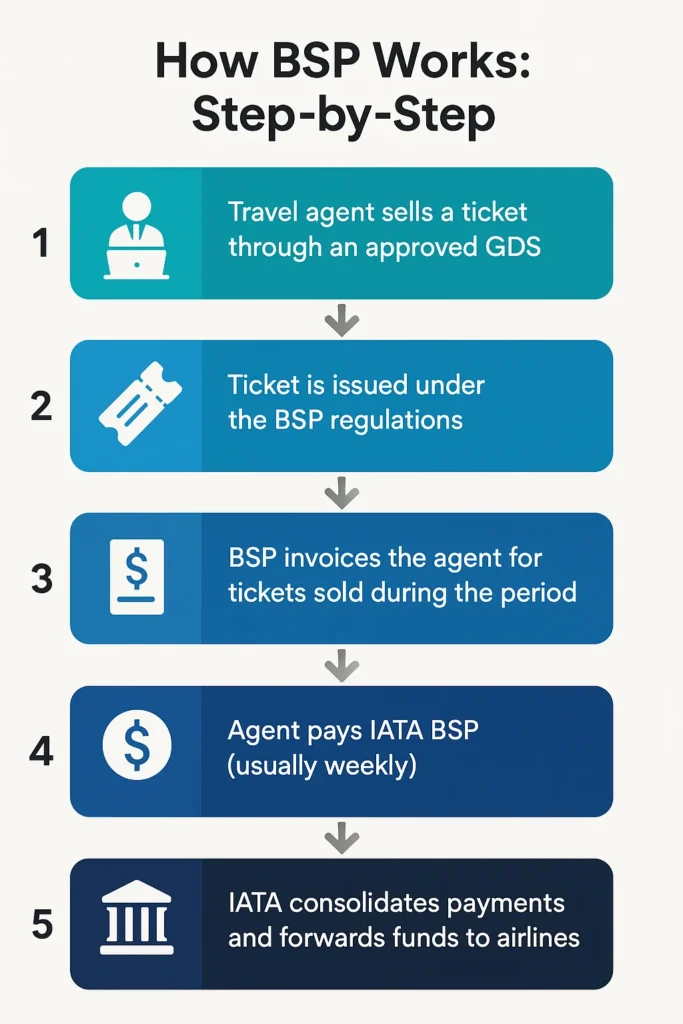The Billing and Settlement Plan (BSP) is a financial system created by the International Air Transport Association (IATA) to simplify and standardize payments between travel agents and airlines.
Established in the 1970s, BSP has transformed how the aviation industry manages transactions by providing a centralized and reliable platform for billing and settlement.
Today, it supports over 370 airlines and thousands of travel agents worldwide, ensuring that payments are processed quickly, accurately, and with transparency.
By consolidating many individual transactions into a single monthly settlement, BSP reduces administrative burdens and minimizes the risks of errors or delays.
This system plays a crucial role in maintaining trust and efficiency within the global travel ecosystem.
In this article, we will explore how BSP operates, the extent of its global reach, the advantages it offers, the challenges it faces, and its role in regulatory compliance.
Whether you are an industry professional or simply interested in how airline payments are managed, this guide will provide you with a clear and comprehensive understanding of the BSP system and its significance in modern aviation.
What is IATA’s Billing and Settlement Plan (BSP)?
The Billing and Settlement Plan (BSP) is a centralized invoicing and payment system developed by the International Air Transport Association (IATA).
Instead of travel agents managing separate agreements and payments with each airline individually, the BSP simplifies the process by providing a single platform where all parties can complete their financial transactions.
This system is managed by IATA to ensure consistency and reliability across the aviation industry.
How BSP Works: Step-by-Step

Key Features of BSP:
- Acts as a centralized financial clearinghouse, consolidating payments between travel agents and airlines.
- Significantly reduces administrative work for both airlines and travel agents by streamlining the billing and settlement process.
- Supports transactions in local currencies, making it easier to handle payments worldwide.
- Fully compatible with electronic ticketing (ET), facilitating efficient and modern ticket sales and settlements.
By bringing together payments in one standardized system, BSP improves transparency, speeds up settlements, and helps maintain smooth financial operations between airlines and travel agents globally.
BSP Member Countries and Global Coverage
The Billing and Settlement Plan (BSP) operates in over 180 countries and territories worldwide. It serves more than 90,000 IATA-accredited travel agents and over 370 airlines, making it one of the most extensive systems for airline ticketing and payments.
Regional Presence (Examples):
| Region | Key BSP Markets |
|---|---|
| Europe | United Kingdom, Germany, France |
| Asia-Pacific | China, India, Japan |
| Americas | United States, Brazil, Argentina |
| Africa | South Africa, Kenya, Egypt |
| Middle East | United Arab Emirates, Saudi Arabia |
This broad global coverage ensures BSP supports the financial transactions of airlines and travel agents across diverse markets and currencies.
For the most current list of participating countries and territories, please refer to the official IATA BSP page.
Benefits of BSP
The Billing and Settlement Plan (BSP) offers clear advantages to airlines, travel agents, and regulators by simplifying financial transactions and improving transparency.
For Airlines:
- Streamlined Collections: BSP simplifies the process of collecting ticket payments from travel agents, reducing delays and errors.
- Reduced Workload: It cuts down on accounting and reconciliation tasks since all payments are handled through one system.
- Lower Credit Risks: By working only with IATA-accredited agents, airlines reduce the chances of payment defaults and financial losses.
For Travel Agents:
- One Accreditation, Many Airlines: Agents gain access to hundreds of airlines with a single BSP membership, avoiding complex individual agreements.
- Simplified Payments: Instead of multiple invoices, agents receive consolidated billing, making payments easier to manage.
- Clear, Standard Rules: BSP follows standardized procedures, helping agents stay compliant and understand their obligations.
For Regulators and the Industry:
- Improved Financial Transparency: BSP provides clear records of transactions, enabling better oversight.
- Easier Auditing: Regulators can audit and verify payments more efficiently.
- Supports Data Tracking: Helps policymakers plan and enforce aviation regulations with reliable financial data.
Challenges and Issues
Despite these benefits, BSP faces some important challenges:
- Cash Flow Pressure on Agents:
Smaller travel agents often struggle with cash flow due to frequent payment deadlines, sometimes weekly, which can be hard to meet. - Default Risks:
Even with security deposits, late or missed payments from agents put airlines at financial risk. - Fraud and Misuse:
With the rise of digital ticketing, fraudulent bookings and misuse of the system remain ongoing concerns. - Regulatory Complexity:
Different countries have diverse rules around currency exchange, taxes, and payment schedules, which can sometimes conflict with BSP operations.
Remedies and Improvements
To address these issues, IATA and industry stakeholders are implementing several solutions:
| Issue | Potential Remedy |
|---|---|
| Cash Flow Issues | Extended payment deadlines and more flexible credit terms |
| Default Risks | Risk-based evaluation of agents and insurance-backed guarantees |
| Fraud | Use of AI-powered transaction monitoring and ticketing limits |
| Regulation Conflicts | Formation of local BSP governance and cooperation with governments |
Recent Innovations

- NewGen ISS: IATA’s updated accreditation system introduces flexible risk models and new payment options, helping agents and airlines manage transactions more effectively.
- Transparency in Payments (TIP): This initiative ensures that all indirect ticket sales are tracked clearly, improving trust and accountability.
- E-invoicing & Digitalization: By automating billing and payment processes, BSP improves accuracy and speeds up transactions, reducing errors and manual work.
Overall, BSP continues to evolve, balancing efficiency and security to meet the needs of the global aviation industry.
Conclusion
The International Air Transport Association’s (IATA) Billing and Settlement Plan (BSP) is a cornerstone of the global aviation financial system.
Serving as a centralized clearinghouse for payments between airlines and travel agents, the Billing and Settlement Plan simplifies what would otherwise be a highly complex and fragmented process.
By consolidating transactions into one standardized platform, BSP significantly reduces administrative costs and operational inefficiencies while enhancing security for all parties involved.
As the air travel industry rapidly embraces digital transformation, the Billing and Settlement Plan continues to evolve to support modern requirements.
Innovations such as the NewGen ISS accreditation program, AI-powered fraud detection, and digital invoicing are strengthening the system’s resilience, transparency, and flexibility.
These advancements not only benefit airlines and travel agents by improving cash flow management and reducing risks but also assist regulators in maintaining a compliant and trustworthy marketplace.
In summary, the Billing and Settlement Plan remains an indispensable tool in ensuring seamless financial operations within the airline industry.
Its ongoing modernization efforts guarantee that BSP will continue to support the dynamic needs of global air travel, fostering a secure, efficient, and transparent environment for airline commerce worldwid
FAQs
- What is BSP in simple terms?
BSP is a system where travel agents and airlines settle payments through IATA, eliminating the need for separate agreements or multiple transactions. - How often do agents need to pay BSP?
Payments are typically made weekly but may vary by country or the agent’s risk profile under NewGen ISS. - Is BSP only for IATA members?
Yes, only IATA-accredited travel agents and member airlines can participate in BSP. - What happens if an agent fails to pay BSP on time?
Agents may face penalties, suspension, or be required to provide additional financial guarantees. - How does BSP handle disputes?
Disputes are managed through formal BSP procedures involving documentation review and mediation by IATA.


